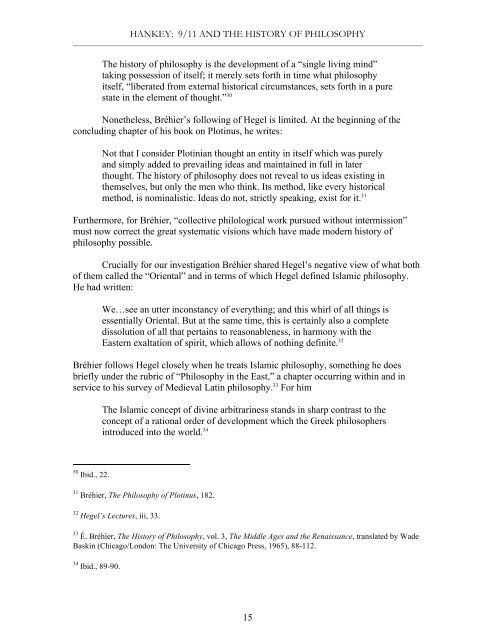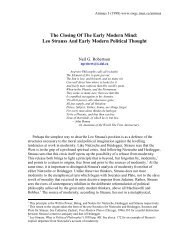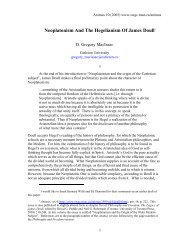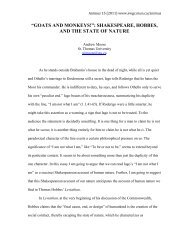HANKEY: 9/<strong>11</strong> AND THE HISTORY OF PHILOSOPHYevolution; for, in history as <strong>the</strong>y conceive it, a doctrine…is…a necessarymoment in <strong>the</strong> evolution which produces it <strong>and</strong> which carries it away. 24The Middle Ages posed <strong>the</strong> greatest problem for <strong>the</strong> construction <strong>of</strong> this progressivehistory—a problem which was solved by Hegel when he “saw in Christianity…<strong>the</strong>essential principle <strong>of</strong> modern philosophy.” 25 For <strong>the</strong>se progressive historians, as forAristotle, <strong>the</strong> nature <strong>of</strong> a living being <strong>and</strong> also <strong>the</strong> stages <strong>of</strong> its growth can only be judgedwhen it has reached its perfection. In consequence, as Bréhier writes:This is why <strong>the</strong> history <strong>of</strong> philosophy in Comte <strong>and</strong> Hegel… is an invertedhistory, which really begins at <strong>the</strong> end, <strong>and</strong> disposes all its content in timeaccording to its view <strong>of</strong> <strong>the</strong> issue <strong>of</strong> <strong>the</strong> process. It is in <strong>the</strong> philosophy <strong>of</strong>mind <strong>of</strong> Hegel <strong>and</strong> in <strong>the</strong> positivism <strong>of</strong> Comte that we must seek <strong>the</strong>explanation <strong>of</strong> <strong>the</strong> riddle <strong>of</strong> history, or ra<strong>the</strong>r, <strong>the</strong> authority for treatinghistory as a riddle to be solved….[Previous historians] always writehistory as if we had arrived at what <strong>the</strong> Apocalypse calls <strong>the</strong> ‘end <strong>of</strong> time’.This allows <strong>the</strong> Hegelians to treat <strong>the</strong> history <strong>of</strong> philosophy as a revelation<strong>of</strong> <strong>the</strong> mind to itself, <strong>and</strong> to approach <strong>the</strong> history <strong>of</strong> thought with <strong>the</strong>respect which <strong>the</strong> <strong>the</strong>ologian shows for <strong>the</strong> Scriptures: <strong>the</strong> Entwicklung isa Selbst<strong>of</strong>fenbarung. 26As with Hegel, in this own work when he functions as an historian, Bréhier says<strong>of</strong> himself, “I remain a philosopher.” He writes <strong>of</strong> his history: “it is first a recitation asfaithful as I am capable <strong>of</strong> making it; it is, however, not only a recitation <strong>and</strong>…my finalpurpose…is to disengage, in its purity, <strong>the</strong> essence <strong>of</strong> philosophy,” 27 <strong>the</strong> rationality,which he regarded as needing to be protected <strong>and</strong> promoted. Bréhier makes hisdependence explicit: Hegel (<strong>and</strong> Comte) provide <strong>the</strong> basis, <strong>and</strong> Hegel (<strong>and</strong> Leibniz) give<strong>the</strong> model for unifying philosophy <strong>and</strong> history. 28 None<strong>the</strong>less, for him <strong>the</strong> nineteenthcenturypredecessors represent an extreme position where “The past is no longer opposedto <strong>the</strong> present; <strong>the</strong> past conditions it <strong>and</strong>, justified by it, <strong>the</strong> past merely unfolds <strong>the</strong> unity<strong>of</strong> a systematic <strong>and</strong> preconceived plan.” 29 This criticism is not, however, a rejection.Bréhier identifies his own work in writing <strong>the</strong> history <strong>of</strong> philosophy with a conception <strong>of</strong>philosophical reason he finds in Hegel’s Encyclopedia:24 Ibid., 166-167.25 Ibid., 167.26 Ibid., 168 <strong>and</strong> 171.27 Bréhier, “Comment je comprends,” 7 & 9.28 Ibid., 2.29 É. Bréhier, The <strong>History</strong> <strong>of</strong> <strong>Philosophy</strong>, i, 23.14
HANKEY: 9/<strong>11</strong> AND THE HISTORY OF PHILOSOPHYThe history <strong>of</strong> philosophy is <strong>the</strong> development <strong>of</strong> a “single living mind”taking possession <strong>of</strong> itself; it merely sets forth in time what philosophyitself, “liberated from external historical circumstances, sets forth in a purestate in <strong>the</strong> element <strong>of</strong> thought.” 30None<strong>the</strong>less, Bréhier’s following <strong>of</strong> Hegel is limited. At <strong>the</strong> beginning <strong>of</strong> <strong>the</strong>concluding chapter <strong>of</strong> his book on Plotinus, he writes:Not that I consider Plotinian thought an entity in itself which was purely<strong>and</strong> simply added to prevailing ideas <strong>and</strong> maintained in full in laterthought. The history <strong>of</strong> philosophy does not reveal to us ideas existing in<strong>the</strong>mselves, but only <strong>the</strong> men who think. Its method, like every historicalmethod, is nominalistic. Ideas do not, strictly speaking, exist for it. 31Fur<strong>the</strong>rmore, for Bréhier, “collective philological work pursued without intermission”must now correct <strong>the</strong> great systematic visions which have made modern history <strong>of</strong>philosophy possible.Crucially for our investigation Bréhier shared Hegel’s negative view <strong>of</strong> what both<strong>of</strong> <strong>the</strong>m called <strong>the</strong> “Oriental” <strong>and</strong> in terms <strong>of</strong> which Hegel defined Islamic philosophy.He had written:We…see an utter inconstancy <strong>of</strong> everything; <strong>and</strong> this whirl <strong>of</strong> all things isessentially Oriental. But at <strong>the</strong> same time, this is certainly also a completedissolution <strong>of</strong> all that pertains to reasonableness, in harmony with <strong>the</strong>Eastern exaltation <strong>of</strong> spirit, which allows <strong>of</strong> nothing definite. 32Bréhier follows Hegel closely when he treats Islamic philosophy, something he doesbriefly under <strong>the</strong> rubric <strong>of</strong> “<strong>Philosophy</strong> in <strong>the</strong> East,” a chapter occurring within <strong>and</strong> inservice to his survey <strong>of</strong> Medieval Latin philosophy. 33 For himThe Islamic concept <strong>of</strong> divine arbitrariness st<strong>and</strong>s in sharp contrast to <strong>the</strong>concept <strong>of</strong> a rational order <strong>of</strong> development which <strong>the</strong> Greek philosophersintroduced into <strong>the</strong> world. 3430 Ibid., 22.31 Bréhier, The <strong>Philosophy</strong> <strong>of</strong> Plotinus, 182.32 Hegel’s Lectures, iii, 33.33 É. Bréhier, The <strong>History</strong> <strong>of</strong> <strong>Philosophy</strong>, vol. 3, The Middle Ages <strong>and</strong> <strong>the</strong> Renaissance, translated by WadeBaskin (Chicago/London: The University <strong>of</strong> Chicago Press, 1965), 88-<strong>11</strong>2.34 Ibid., 89-90.15
















